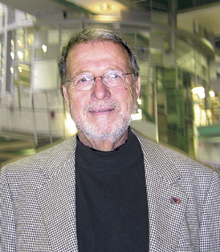Future of Quebec cinema still looks bright: Panel

Mel Hoppenheim
Photo by Robert Winters
“You’ve chosen a very difficult profession,” Mel Hoppenheim warned his audience, made up mainly of cinema students and alumni. “It’s a rough road, I wish you all good luck.”
But Hoppenheim, whose Mel’s Cité du Cinéma complex is where the big Hollywood movies shoot when they come to Montreal, said there are bright spots in the outlook for cinema in Quebec. He was speaking at a panel discussion on the future of Quebec cinema, part of the first annual Alumni/Art Matters Film Festival.
One bright spot is that producers don’t have to listen to California governor Arnold Schwarzenegger when he tells Hollywood studios to stop shooting films in Canada, Hoppenheim said, “He can’t tell the filmmakers of the world where to shoot their films!”
One dark cloud over the movie industry is the problem of pirated copies of films. After a movie is released in theatres, “a week Monday in Asia, 90 million pirated copies are made. The industry can’t afford it,” Hoppenheim said. A possible solution could be to release DVD copies as soon as the movies appear in theatres, and sell them on the Internet at $4 to $5 each.
The Quebec industry was traumatized in December when Ontario increased its tax credit for foreign film companies to 18 per cent, seven points higher than Quebec’s 11 per cent. He called Michel Trudel, his longtime partner and a major movie-equipment supplier, and after some lobbying, he said with a smile, Quebec boosted its tax credit to 20 per cent, “two points higher than Ontario.”
Montreal Film Commissioner Daniel Bissonnette said international competition to attract film shoots “has been ferocious” lately. The cost of making films in Montreal must be comparable to Vancouver and Toronto to make it attractive to shoot here, Bissonnette said.
Matt Holland, Montreal president of ACTRA, the actors’ association, paid tribute to Hoppenheim’s investment in state-of-the-art facilities here. While “it’s good to have three, four or five Hollywood films blow in each year, there is a need to develop our indigenous production.” However, even when domestic films draw audiences, they can be pushed aside by foreign products.
Paul Thinel, a Concordia cinema graduate and feature film director, said the limited financing for local productions means many good projects can’t be made. The panel was moderated by Patricia Lavoie, vice-president of the alumni association and vice-president at production house Zone 3.
Hoppenheim was presented with an Achievement Award (Builders Category), by John Aylen, president of Concordia’s alumni association, with the help of Chris Godziuk, president of the Fine Arts Student Alliance. Richard Kerr, chair of the Mel Hoppenheim School of Cinema, also spoke of Hoppenheim’s accomplishments at the award ceremony.
Outstanding short films by alumni and student filmmakers were screened at the event. They included Electrinité, by Félix Lajeunesse, which won the top student film prize at the 2003 Festival des Films du Monde. Another was a personal documentary by MFA graduate Michael Rollo, who now works as production co-ordinator at the School of Cinema.
Each film was introduced by the filmmaker, who provided the context for what the audience was about to see. The student films presented were chosen by the Cinema Students Association, represented by Ameesha Joshi.